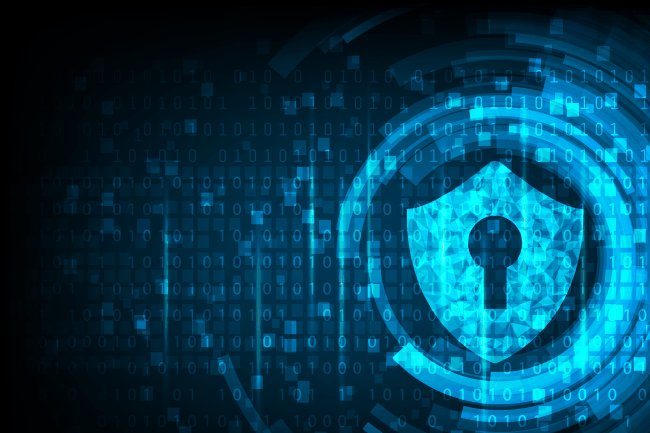
CYBER SECURITY | 7.5 MIN READ
As a Managed Service Provider, our clients ask us about the benefits of cloud versus on-premise security all the time. Data security is becoming more and more crucial for businesses as cyber attacks are on the rise, which means that companies need to determine which form of data security is a better fit. Which one is better for your business? Read more to find out.
Not enough time? Jump to:
How to Strengthen Your Current Network
What's the Difference?
With on-premise security, your servers and data are physically located in your office, and you use backup and disaster recovery software to extract the data when you need it during a network failure. The management and maintenance of your network is up to you unless you decide to outsource support.
With cloud-based security, a third party company hosts your servers and data for you in a data center. These companies can assist in managing your network.
Which One Is Better?
The short answer is that, based on what priorities you have, either type of security could be a good fit for your business. Keep reading to see the benefits of each type and find out which one works for you.
Benefits of On-Premise
Customization
On-premises solutions are infinitely customizable because your entire network, including your servers and data, are in your office. While this can be costly, it allows one to develop a customized solution fit for their specific needs.
Regulatory Compliance

Many companies, especially those in the legal, healthcare, and financial industries, must comply with compliance regulations related to the storage and sharing of data.
Companies with especially strict cyber security policies to follow might feel more comfortable housing their data in the office instead of hundreds of miles away in a data center.
However, on-premise servers have some security risks. Unlike data centers, which come with dedicated security personnel and are built to withstand acts of nature such as fires, your office can be more susceptible to break-ins and weather like tornadoes, which pose threats to your servers containing your data.
Great for Those With In-House IT Personnel
If your company already has an internal IT team, you could benefit from keeping your cyber security in-house. While the up-front investments for hardware/software can add up, you would already have dedicated staff to manage the infrastructure after it's up and running, keeping data both secure and close by.
Cheaper

On-premise security can be a cheaper up-front cost for small to medium sized businesses, especially if you already have in-house IT. If you buy your own servers, that investment could last you a long time. Additionally, already having dedicated internal IT staff could save you the money of having to outsource support.
However, keep in mind that the cost to maintain and repair servers can add up, and if your servers break or become outdated, the cost to replace them is on you.
Benefits of Cloud
Security Quality

Some businesses could find the cloud to be more secure because your data isn't physically at your office for hackers or employees with bad intentions to easily take. This can lessen the odds of a data breach.
Additionally, your cloud-based data isn't as susceptible to robbers and acts of nature because data centers usually have strengthened walls and advanced fire/temperature gauging systems, among other security features.
With cloud-based security, data center employees are there solely to protect your data. On the other hand, if you only have internal IT personnel to protect your data, those employees could get distracted by other tasks, which means they might not have as much time to focus on solely protecting your network.
While on-premise setups can also keep data secure with high efficiency from the start, as a cloud system learns your network and grows with you, over time it can become more secure than on-premise security.
Regulatory Compliance
While companies who must comply with data security regulations might be hesitant to keep data in the cloud, as long as their cloud security provider does their due diligence in staying compliant and up to code, risk can be effectively mitigated.
Consider this − according to Gartner, 95% of cloud-based security failures through 2020 will be the customers' fault, for instance if they fall for a phishing scheme or use easy-to-crack passwords. So, some of the risk of cloud-based data breaches could be managed simply by training your employees on cyber security best practices.
RELATED: Cyber Security Solutions: 12 Best Practices for Businesses
Storage Immortality
Technology develops at such a rapid pace that what's cutting-edge today can quickly become outdated tomorrow. If on-premise data centers break or become obsolete, the cost and time to move your data can be a burden.
With cloud storage, your data is housed in a data center forever. This is especially a benefit, because as more and more job operations move online, having your data already in a data center can streamline business processes.
Minimal Downtime
Downtime can have significant consequences for a company. For businesses that prioritize keeping network downtime to a minimum, the cloud could be the way to go because it backs up your data in multiple places.
This means that in the event of a network outage, your data can be restored from a backup faster than an on-premise situation. With an on-premise setup, since your data is housed onsite, if a server were to go down, that data can't easily be recovered from, for instance, a data center in another location.
Scalability

Scalability is an area where the cloud has a clear advantage. With the cloud, data centers can quickly re-adjust their resources to meet client demand. For instance, if a company experienced rapid growth and needed to expand their infrastructure and computing power, the cloud could do this with ease.
In this same scenario, a company with on-premise security would have to quickly invest in more hardware and software to build up their infrastructure. Startups and other fast-growing businesses could benefit immensely from this model. Additionally, companies with a large amount of remote workers could benefit from the scalability of cloud-based security.
While reading this article might persuade you to choose one security solution over another, keep in mind that security solutions are not one-size-fits-all and can be customized to fit your needs.
If you don't feel pulled strongly in either direction, there are hybrid options available that have aspects of both on-premise and cloud security.
As a Managed Service Provider, we help customers make the switch to cloud-based security often. We, as well as the data security industry in general, tend to recommend cloud-based solutions.
RELATED: What is a Managed Service Provider?
How to Strengthen Your Current Network
Cyber attacks can lead to severe network downtime. Upgrading the way your data is stored and backed up is a great way to protect your data in the event of a network outage, but it doesn't protect your network from cyber threats. Keep reading to learn a few small steps that can be taken along with upgrading your data storage to prevent cyber attacks.
Control Employee Internet Usage

An easy way to minimize data breaches is to both limit which employees have the ability to download files and programs on their work computers as well as block users from accessing certain risky websites. For instance, Google Chrome has a setting that lets a company prevent someone using Chrome from downloading files.
Taking these steps can prevent network breaches, especially when companies have employees who download music or browse random websites while at work. Additionally, those who allow their children, who might not know which risky websites to avoid, to play on their work laptop at home could put your security at risk.
This type of free Internet usage can potentially lead to an employee accidentally downloading a virus or clicking on a malware-loaded link. If this happens, your network can quickly become compromised.
Institute a Password Policy
A simple way to protect passwords is to encourage employees to not use the same password for company and personal accounts. Repeat passwords give a hacker multiple opportunities to discover the login and use it to breach your network.
Though this is the hardest rule to follow, tell employees to not write down any company passwords anywhere, whether that be on a sticky note or in the Notes app on their phone. Writing down passwords leaves documentation that hackers can find and then use to gain access to your network.
To create a strong, unique password, include capital and lowercase letters, use at least 8-10 characters, and include a number and symbol. A pro tip is to think of a phrase that you can remember, preferably not a personalized phrase, and turn that into a more secure yet easy-to-remember passphrase.
For instance, the phrase "My favorite vacation was the summer of 1995 - I visited 3 different countries!” could turn into a password that looks like “MFVwtso1995-Iv3DC!”
Conduct Cyber Security Awareness Training

You could have the most secure network in the world and your employees could render it ineffective with poor Internet practices. Your employees are your company's greatest asset and, unfortunately, its greatest liability.
Cyber security training shows your employees best practices to keep company data safe and minimize network breaches. Employees can be educated on Internet best practices and how to detect phishing emails, among other topics.
This training decreases the likelihood that your employees will click a link or fall for a scam that could lead to a network breach or cyber attack.
RELATED: Why Your Employees Are Your Weakest Link
Consider Managed IT Services
If you are looking for a massive upgrade to your network's security, consider hiring a managed IT services provider (also known as an MSP).
An MSP is a third-party company that manages your network security. They can help you secure data by implementing an on-premise or cloud security solution.
To further secure data, they can implement the above suggestions, such as password policies and cyber security awareness training, and more.
An MSP's cyber security tactics extend beyond just data protection. They work with you to build a custom network security solution that minimizes downtime and evolves to keep up with the constantly shifting tactics of hackers.
Cyber security can be a technical and complex topic, which can make understanding important concepts frustrating.
As a Managed Service Provider, we strive to answer all audience questions about important cyber security-related content to make our industry more understandable.
For more cyber security-related content, follow our blog!
Posted by Erica Kastner

Erica Kastner is a lead Marketing Specialist at Standard Office Systems as well as a University of Georgia graduate. She aims to use her passion for problem-solving to help businesses understand how to better leverage their network infrastructure.

